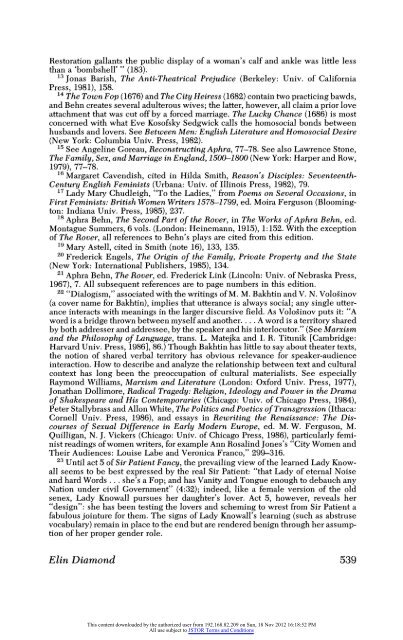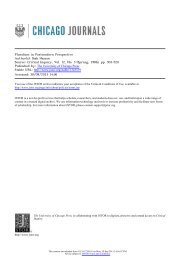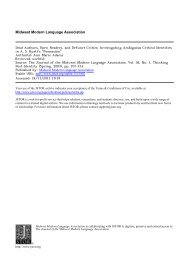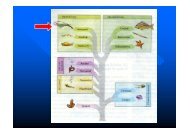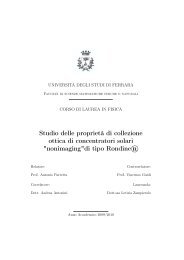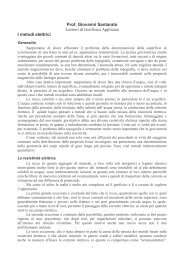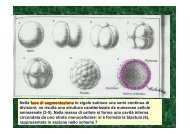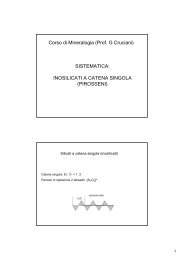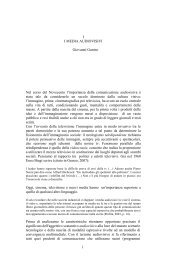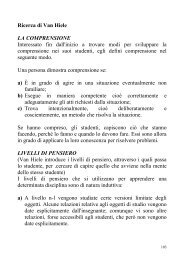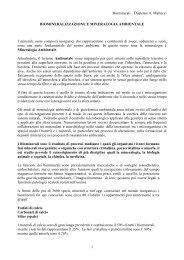Gestus and Signature in Aphra Behn's the Rover
Gestus and Signature in Aphra Behn's the Rover
Gestus and Signature in Aphra Behn's the Rover
You also want an ePaper? Increase the reach of your titles
YUMPU automatically turns print PDFs into web optimized ePapers that Google loves.
Restoration gallants <strong>the</strong> public display of a woman's calf <strong>and</strong> ankle was little less<br />
than a 'bombshell'" (183).<br />
13 Jonas Barish, The Anti-Theatrical Prejudice (Berkeley: Univ. of California<br />
Press, 1981), 158.<br />
14 The Town Fop (1676) <strong>and</strong> The City Heiress (1682) conta<strong>in</strong> two practic<strong>in</strong>g bawds,<br />
<strong>and</strong> Behn creates several adulterous wives; <strong>the</strong> latter, however, all claim a prior love<br />
attachment that was cut off by a forced marriage. The Lucky Chance (1686) is most<br />
concerned with what Eve Kosofsky Sedgwick calls <strong>the</strong> homosocial bonds between<br />
husb<strong>and</strong>s <strong>and</strong> lovers. See Between Men: English Literature <strong>and</strong> Homosocial Desire<br />
(New York: Columbia Univ. Press, 1982).<br />
15 See Angel<strong>in</strong>e Goreau, Reconstruct<strong>in</strong>g <strong>Aphra</strong>, 77-78. See also Lawrence Stone,<br />
The Family, Sex, <strong>and</strong> Marriage <strong>in</strong> Engl<strong>and</strong>, 1500-1800 (New York: Harper <strong>and</strong> Row,<br />
1979), 77-78.<br />
16 Margaret Cavendish, cited <strong>in</strong> Hilda Smith, Reason's Disciples: Seventeenth-<br />
Century English Fem<strong>in</strong>ists (Urbana: Univ. of Ill<strong>in</strong>ois Press, 1982), 79.<br />
17 Lady Mary Chudleigh, "To <strong>the</strong> Ladies," from Poems on Several Occasions, <strong>in</strong><br />
First Fem<strong>in</strong>ists: British Women Writers 1578-1799, ed. Moira Ferguson (Bloom<strong>in</strong>gton:<br />
Indiana Univ. Press, 1985), 237.<br />
18<strong>Aphra</strong> Behn, The Second Part of <strong>the</strong> <strong>Rover</strong>, <strong>in</strong> The Works of <strong>Aphra</strong> Behn, ed.<br />
Montague Summers, 6 vols. (London: He<strong>in</strong>emann, 1915), 1:152. With <strong>the</strong> exception<br />
of The <strong>Rover</strong>, all references to <strong>Behn's</strong> plays are cited from this edition.<br />
19 Mary Astell, cited <strong>in</strong> Smith (note 16), 133, 135.<br />
20 Frederick Engels, The Orig<strong>in</strong> of <strong>the</strong> Family, Private Property <strong>and</strong> <strong>the</strong> State<br />
(New York: International Publishers, 1985), 134.<br />
21 <strong>Aphra</strong> Behn, The <strong>Rover</strong>, ed. Frederick L<strong>in</strong>k (L<strong>in</strong>coln: Univ. of Nebraska Press,<br />
1967), 7. All subsequent references are to page numbers <strong>in</strong> this edition.<br />
22 "Dialogism," associated with <strong>the</strong> writ<strong>in</strong>gs of M. M. Bakht<strong>in</strong> <strong>and</strong> V. N. Volog<strong>in</strong>ov<br />
(a cover name for Bakht<strong>in</strong>), implies that utterance is always social; any s<strong>in</strong>gle utterance<br />
<strong>in</strong>teracts with mean<strong>in</strong>gs <strong>in</strong> <strong>the</strong> larger discursive field. As Volos<strong>in</strong>ov puts it: "A<br />
word is a bridge thrown between myself <strong>and</strong> ano<strong>the</strong>r.... A word is a territory shared<br />
by both addresser <strong>and</strong> addressee, by <strong>the</strong> speaker <strong>and</strong> his <strong>in</strong>terlocutor." (See Marxism<br />
<strong>and</strong> <strong>the</strong> Philosophy of Language, trans. L. Matejka <strong>and</strong> I. R. Titunik [Cambridge:<br />
Harvard Univ. Press, 1986], 86.) Though Bakht<strong>in</strong> has little to say about <strong>the</strong>ater texts,<br />
<strong>the</strong> notion of shared verbal territory has obvious relevance for speaker-audience<br />
<strong>in</strong>teraction. How to describe <strong>and</strong> analyze <strong>the</strong> relationship between text <strong>and</strong> cultural<br />
context has long been <strong>the</strong> preoccupation of cultural materialists. See especially<br />
Raymond Williams, Marxism <strong>and</strong> Literature (London: Oxford Univ. Press, 1977),<br />
Jonathan Dollimore, Radical Tragedy: Religion, Ideology <strong>and</strong> Power <strong>in</strong> <strong>the</strong> Drama<br />
of Shakespeare <strong>and</strong> His Contemporaries (Chicago: Univ. of Chicago Press, 1984),<br />
Peter Stallybrass <strong>and</strong> Allon White, The Politics <strong>and</strong> Poetics of Transgression (Ithaca:<br />
Cornell Univ. Press, 1986), <strong>and</strong> essays <strong>in</strong> Rewrit<strong>in</strong>g <strong>the</strong> Renaissance: The Discourses<br />
of Sexual Difference <strong>in</strong> Early Modern Europe, ed. M. W. Ferguson, M.<br />
Quilligan, N. J. Vickers (Chicago: Univ. of Chicago Press, 1986), particularly fem<strong>in</strong>ist<br />
read<strong>in</strong>gs of women writers, for example Ann Rosal<strong>in</strong>d Jones's "City Women <strong>and</strong><br />
Their Audiences: Louise Labe <strong>and</strong> Veronica Franco," 299-316.<br />
23 Until act 5 of Sir Patient Fancy, <strong>the</strong> prevail<strong>in</strong>g view of <strong>the</strong> learned Lady Knowall<br />
seems to be best expressed by <strong>the</strong> real Sir Patient: "that Lady of eternal Noise<br />
<strong>and</strong> hard Words ... she's a Fop; <strong>and</strong> has Vanity <strong>and</strong> Tongue enough to debauch any<br />
Nation under civil Government" (4:32); <strong>in</strong>deed, like a female version of <strong>the</strong> old<br />
senex, Lady Knowall pursues her daughter's lover. Act 5, however, reveals her<br />
"design": she has been test<strong>in</strong>g <strong>the</strong> lovers <strong>and</strong> schem<strong>in</strong>g to wrest from Sir Patient a<br />
fabulous jo<strong>in</strong>ture for <strong>the</strong>m. The signs of Lady Knowall's learn<strong>in</strong>g (such as abstruse<br />
vocabulary) rema<strong>in</strong> <strong>in</strong> place to <strong>the</strong> end but are rendered benign through her assumption<br />
of her proper gender role.<br />
El<strong>in</strong> Diamond 539<br />
This content downloaded by <strong>the</strong> authorized user from 192.168.82.209 on Sun, 18 Nov 2012 16:18:52 PM<br />
All use subject to JSTOR Terms <strong>and</strong> Conditions


